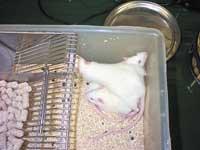Hunger and antidepressants
Obesity is an increasingly widespread disease in today's society and a risk factor for many diseases. Therefore, it is essential to find new and effective drugs to treat consistency.
Appetite is the sensation that occurs in the hypothalamus and its regulation is a complex process that depends on neuropeptides, neurotransmitters and many hormones. In this process we must take into account two types of neuropeptides: orexigens or food generators and anorexigens or that reduce appetite.
Among the orexigens are neuropeptides Y, some opioid peptides, endogenous cannabinoids, etc. Anorexigens include CRF (corticotropin releasing factor), CARTUCHO (cocaine and amphetamine related transcript) melanocortin, galanin and cytokines.
All these peptides act on the hypothalamus and their interactions cause hunger and satiety.

Changes in these neuropeptides can lead to diseases such as obesity, anorexia nervosa, or bulimia. Currently there are no suitable drugs to treat these diseases and, in addition, some drugs used are highly dangerous and unhealthy as amphetamines.
Fluoxetine
Antidepressants such as fluoxetine reduce appetite. In fact, this substance acts on the areas of the hypothalamus that regulate the action of neuropeptides. Therefore, this antidepressant can also be useful for treating consistency.
The Department of Nutrition and Bromatology of the Faculty of Pharmacy of Vitoria-Gasteiz is investigating the mechanism of action of fluoxetine in genetically thickened rats (Zucker fa/fa). Fluoxetine has shown that these rats consume 50% less. Therefore, the body weight is lower and the size of the fatty tissues of different types decreases.
When investigating the mechanism of action of fluoxetine it is observed that it reduces the amount of neuropeptide Y. This peptide is the ear, that is, the cause of hunger. Fluoxetine prevents the transport of this peptide by decreasing appetite. Therefore, fluoxetine acts on the peptides that produce hunger.
In addition, its influence on appetite reducing peptides such as melanocortinas is currently being studied. Melanocortinas are one of the most important natural mechanisms that control intake. The possible changes in the operating system of melanocortinas are currently being measured, both in <unk> -MSH (alpha melanocyte stimulating hormone) and in MC4-R melanocortinas receptors.
Obesity is a serious health problem in our society and also causes other diseases such as diabetes, hypertension or dyslipidemia. Researchers, with a better understanding of the mechanisms of action of antidepressants, hope to improve treatments against obesity.
Project title: Influence of fluoxetine on the neurochemical mechanisms, consistency and energy metabolism that regulate appetite. Objective: Investigate the efficacy of fluoxetine in chronic treatment against obesity. Directors: Enrique Etxebarria Orella and María del Puy Portillo Baquedano. Working team: Itziar Txurruka Ortega, Vanesa de la Cruz Moro, Lena Moron Alcazar and María Teresa Maraculla Arenaza. Department: Department of Physiology and Department of Nutrition and Bromatology. Financing: Research project 1999-51 of the Basque Government. |
Buletina
Bidali zure helbide elektronikoa eta jaso asteroko buletina zure sarrera-ontzian








